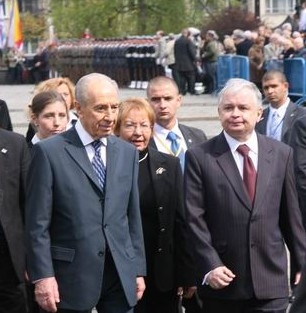Early in the morning, I fell in love with the girl that later on became my wife. At that time, we were so naive. I wanted to charm her, so I read her Capital by Marx. I thought somehow she would be convinced by the strength of his criticism about capital.
Meaning of the quote
The quote suggests that Shimon Peres, an Israeli statesman, fell in love with a woman in the morning. At the time, they were both very young and inexperienced. Peres wanted to impress the woman, so he read her a book called "Capital" by the philosopher Karl Marx, thinking that the strong arguments against capitalism would convince her. However, the quote implies that this approach did not work as Peres had hoped.

About Shimon Peres
Shimon Peres was a renowned Israeli politician and statesman who served as the Prime Minister and President of Israel. He had a long and illustrious political career spanning over 70 years, making him the longest-serving member of the Knesset in history. Peres was renowned for his oratorical brilliance and was considered the last link to Israel’s founding generation.
More quotes from Shimon Peres
When you have two alternatives, the first thing you have to do is to look for the third that you didn’t think about, that doesn’t exist.
Israeli politician (1923-2016)
I was learning, as I did in the Ministry of Defense. I never knew, but I always learned.
Israeli politician (1923-2016)
I worked with a group of people who argued day and night – professors, officials, the Minister of Finance – but there were decisions that I had to make.
Israeli politician (1923-2016)
Television has made dictatorship impossible but democracy unbearable.
Israeli politician (1923-2016)
There was one occasion when I was very young – eight years or seven years old – that Jewish businessmen went through the forest, and they were assassinated. And that was for the first time I saw in our paper where there were assassinations in our place.
Israeli politician (1923-2016)
He taught me literature, and he actually taught me how to read. He was my personal mentor.
Israeli politician (1923-2016)
I have a brother younger than me. My mother was a librarian, so from her, I got the taste to read.
Israeli politician (1923-2016)
They thought that I was a man with reasonable judgment, so I was never under pressure from my parents; I could do whatever I wanted. I never had a negative word from them, nothing whatsoever.
Israeli politician (1923-2016)
I think I was a good student, because I jumped over a school. My main interest was basically history and literature. Sports were basically basketball and swimming at a pool. I was so happy.
Israeli politician (1923-2016)
Early in the morning, I fell in love with the girl that later on became my wife. At that time, we were so naive. I wanted to charm her, so I read her Capital by Marx. I thought somehow she would be convinced by the strength of his criticism about capital.
Israeli politician (1923-2016)
Later on, there were some problems with our navy, so he made me the head of the navy – all things that I hardly knew anything about. I was basically an ignorant young man.
Israeli politician (1923-2016)
Now, I learned soon enough, that among the three, two don’t trust the third one – the third one is the government. Both industry and unions feel the government is a talking organization and a spending organization.
Israeli politician (1923-2016)
I joined the army as a private. I was offered a rank at that time, but I refused. I preferred to remain a private. First of all, I wasn’t taken by ranks, and before I knew it, they put me in the most sensitive positions anyway.
Israeli politician (1923-2016)
What should be the future of Israel? Is the land the most important choice, and for that reason to keep the whole of the land at any cost, or to have a partition and build the Jewish state on part of the land? And the other part?
Israeli politician (1923-2016)
He was the editor of our paper. He created the publishing house in Hebrew. He was – I wouldn’t say the “guru” – but really he was our teacher and a most respected man. I wrote for the paper of the youth movement.
Israeli politician (1923-2016)
If I tax them, in fact, I’m not taxing the capitalists, I am taxing the people who have saved, trusted. It was very controversial, those sorts of things. But finally, it worked out.
Israeli politician (1923-2016)
We asked the workers to give up 25 percent of their salaries. Imagine! We asked the industrialists to freeze all costs, no matter what the inflation is.
Israeli politician (1923-2016)
That was my first lesson from Ben-Gurion. Then I saw him making peace, and I saw him making war. He mobilized me before the war. The man was a very rare combination between a real intellectual and a born leader. There is a contradiction between the two.
Israeli politician (1923-2016)